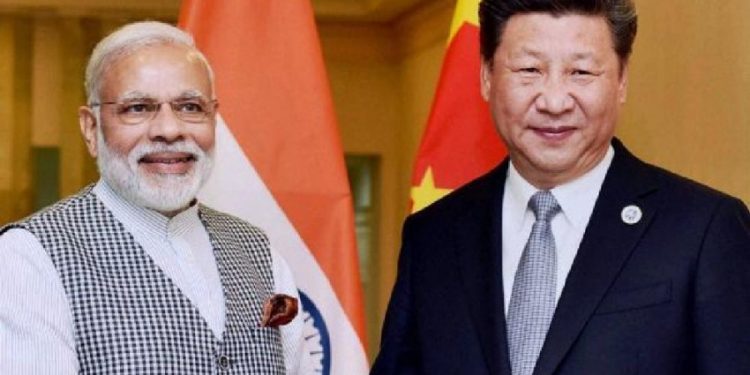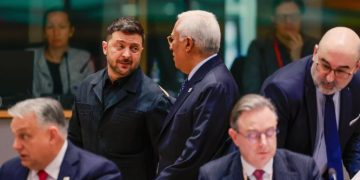Brahma Chellaney
Indian Prime Minister Narendra Modi is “not in a good mood,” US President Donald Trump recently declared, as he offered to mediate India’s resurgent border conflict with China. After years of bending over backward to appease China, Modi has received yet another Chinese encroachment on Indian territory. Will this be enough to persuade him to change his approach?
While India was preoccupied with the COVID-19 crisis, China was apparently planning its next attempt to change the region’s territorial status quo by force. Last month’s swift and well-coordinated incursions by People’s Liberation Army troops into the icy borderlands of India’s Ladakh region were likely the product of months of preparation. The PLA has now established heavily fortified camps in the areas it infiltrated, in addition to deploying weapons on its side of the Line of Actual Control (LAC), within striking distance of Indian deployments.
China’s “unexpected” maneuver should not have been unexpected at all. Last August, China’s government vigorously condemned India’s establishment of Ladakh – including the Chinese-held Aksai Chin Plateau – as a new federal territory. (China seized Aksai Chin in the 1950s, after gobbling up Tibet, which had previously served as a buffer with India.) And the PLA had been conducting regular combat exercises near the Indian border this year.
Deception, concealment, and surprise often accompany China’s use of force, with Chinese leaders repeatedly claiming that military preemption was a defensive measure. Its latest assault on India – which China claims is the actual aggressor – was taken straight from this playbook.
Yet Modi did not see the Chinese incursions coming. His vision seems to have been clouded by the naive hope that, by appeasing China, he could reset the bilateral relationship and weaken China’s ties with Pakistan, another revisionist state that lays claims to sizable swaths of Indian territory.
The China-Pakistan axis has long generated high security costs for India and raised the specter of a two-front war. That is why some Indian leaders have pursued a “defensive wedge strategy,” in which the status quo power seeks to drive a wedge between two allied revisionist states, so that it can focus its capabilities on the more threatening challenger.
In 1999, the first Prime Minister from Modi’s Bharatiya Janata Party, Atal Bihari Vajpayee, sought to win over Pakistan by visiting the country on the inaugural trip of a new bus service from Delhi to Lahore. Vajpayee was rewarded for his “bus diplomacy” with a stealth invasion by Pakistan’s powerful military of the Indian border zone of Kargil. This triggered a localized war, in which both sides lost several hundred soldiers before the status quo ante was restored.
Unlike Vajpayee, Modi has focused his attention on China – with similarly disastrous results. In fact, soon after becoming Prime Minister in 2014 – and just hours before hosting Chinese President Xi Jinping for a summit meeting – he learned that PLA troops had elbowed their way into southern Ladakh’s Chumar area, which lies along the LAC, and built a temporary road there.
The summit was portrayed as a success, even though the Chinese did not withdraw until weeks later, after India agreed to demolish local defensive fortifications. This was the beginning of a policy not of reconciliation, but of appeasement, the costs of which continue to mount.
On a trip to Beijing the next year, Modi surprised his own administration by announcing a decision to issue electronic tourist visas to Chinese nationals upon their arrival in India. He also delisted China as a “country of concern,” in an effort to court Chinese investment. Instead, the move opened India up to even more dumping by Chinese firms. On Modi’s watch, China has more than doubled its trade surplus with India to $60 billion per year – nearly equal to India’s annual defense spending.
Meanwhile, the PLA has continued to encroach on disputed territories. In mid-2017, Indian troops were pushed into another standoff with the PLA – this time, at Doklam, a small and desolate Himalayan plateau where Chinese-ruled Tibet meets the northeastern Indian state of Sikkim and the Kingdom of Bhutan. Indian troops stood up to the Chinese, as the PLA attempted to build a road to the India border through the uninhabited plateau that Bhutan, an Indian ally, regards as its own territory. The standoff lasted 73 days, before China and India agreed to disengage.
India declared the Doklam disengagement a tactical victory. But over the next several months, China steadily expanded its troop deployments by building permanent military structures, thereby gaining control of much of Doklam. Despite being the de facto guarantor of Bhutan’s security, India failed to defend the tiny country’s territorial sovereignty.
Yet Modi maintained India’s appeasement policy. In 2018, his government backed away from official contact with the Dalai Lama and Tibet’s India-based government-in-exile. At the same time, as Xi later revealed, Modi proposed an annual “informal” bilateral summit – a proposal Xi gladly accepted, because high-level meetings aid China’s “engagement with containment” strategy toward India. Two such summits have now been held, as well as 14 other meetings between the two leaders.
And what has Modi gotten for his troubles? China has stepped up its territorial revisionism, while raking in growing profits from the bilateral economic relationship (though, to be sure, India did recently tighten its policy on foreign direct investment, so that any flows from China must be pre-approved).
Modi has himself to blame for this state of affairs. With his excessive personalization of policy and stubborn strategic naiveté, he has shown himself not as the diplomatically deft strongman he purports to be, but as a kind of Indian Neville Chamberlain. Unless he learns from his mistakes and changes his policy toward China, India’s people – and territorial sovereignty – will pay the price.
The writer, Professor of Strategic Studies at the New Delhi-based Center for Policy Research and Fellow at the Robert Bosch Academy in Berlin, is the author of nine books. ©Project Syndicate.






































